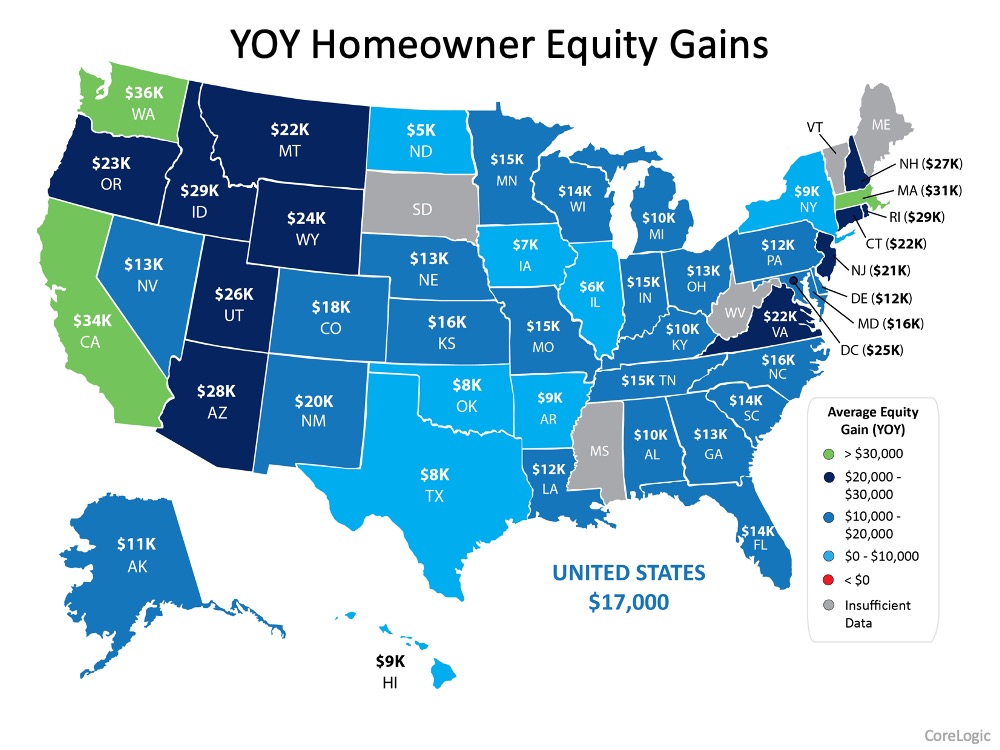
Real Estate News

Headline Real Estate News
December 10th, 2020 – December 19th, 2020
As expected, there has been lots of real estate news activity and good reading in the past week or so! Articles about the how the Pandemic has shaped home buying and rental decisions, mortgage lending standards, Realtor.com’s 2021 Housing Forecast, mortgage application and refinance activity updates, real estate home equity gains, mortgage processing time frames, a look at what the mortgage interest rates may be in 2021 and changes in the QM(Qualified Mortgage).
LOTS GOOD READING!
12/10/20  “Pandemic Reshapes Homebuying & Rental Decisions: Homes.com Survey”
“Pandemic Reshapes Homebuying & Rental Decisions: Homes.com Survey”

Work-from-Home Trend Fuels Relocations by Eliminating Need for Office Proximity
NORFOLK, VA (December 10, 2020) — The COVID-19 pandemic and associated shift to working from home have transformed the location and feature requirements of both homebuyers and renters, according to companion surveys of more than 1,000 consumers and 600 real estate professionals by Homes.com. The “new normal” is fueling more moves from cities to suburbs, more long-distance moves, and new space and amenity demands while also prompting sellers to be more selective in a market where 95% of transactions are receiving multiple offers.
A majority of these moves are likely to be permanent, with nearly three out of four consumers who have moved or planning to move to take advantage of remote work opportunities reporting they will not return to their pre-pandemic residences.
The long tail of the pandemic is expected to impact agents and brokers at least into 2021 as well. With the virus continuing to batter the country and interest rates remaining low, 57% of respondents to the industry survey expect homebuying activity to remain at current robust levels for the next 12 months. An additional 28% predict even more transactions next year.
“The surge in the work-from-home population has rewritten the playbook for many homebuying and rental decisions, from when and where to relocate, to what people are looking for in their next residence,” said Homes.com President, David Mele. “That, in turn, is prompting changes for real estate professionals, many of whom are expanding their market area to better serve clients who are moving farther than before. If working from home becomes standard operating procedure for many companies, as predicted, these changes will be with us for years to come.”
The surveys also found that:
One out of three consumers who moved in the last 12 months did not plan to move before COVID-19 hit. In a related finding, nearly one out of four consumers who moved in the last 12 months or plan to move in the next 12 months report their decision was sparked by a change in their job situation, presumably caused by the pandemic.
* 45% of respondents said they would move if given the chance to work remotely, with 20% indicating that remote working was the reason they moved within the last year.
* The ability to eliminate commuting as a factor in home or rental choices has substantially revised consumers’ location requirements, with * * * 32% of agents and brokers reporting city-to-suburb moves as the #1 change and 23% ranking fewer requests for proximity to public transportation or highways in the #2 spot.
* 40% of consumers who have moved or plan to move are relocating more than 100 miles away, with half of those moving over 500 miles. Industry professionals note that roughly 30% are moving from cities to suburbs, and another 15% are looking for even less populated areas.
* Home feature preferences have shifted substantially during the pandemic, with 78% of real estate professionals citing client requests for home offices as the #1 change followed by larger square footage (57%), outdoor recreational spaces such as pools, hot tubs and decks (45%) and upgraded kitchens (44%). These adjustments illustrate the effect of today’s work-from-home and e-learning needs on creating a practical and comfortable living environment.
* Both homeowners and renters are relocating, with 39% moving to single-family existing homes, 23% to apartments, 10% to condo/townhouses and 10% to single-family new construction. The rest were opting for room rentals in a private residence (6%), moving back in with parents or family (4%) or unspecified (7%).
* The sellers’ market created by the large number of buyers as well as below-average inventory has reduced sellers’ flexibility. According to respondents to Homes.com’s industry survey, many are now less likely to accept a contingency (69%), show a house without a pre-approval letter (59%), negotiate on repairs (57%), or negotiate with buyers for a quick sale (40%). Only 17% of respondents indicated little change from pre-COVID-19 behavior.
Mele discussed these survey findings and their implications for the real estate industry at the annual National Association of Real Estate Editors conference this year.
12/11/20  “Fannie Mae extends relaxed appraisal, lending standards ” Kelsey Ramirez
“Fannie Mae extends relaxed appraisal, lending standards ” Kelsey Ramirez
Extends COVID flexibilities to Jan. 31, 2021
Mortgage giant Fannie Mae extended its relaxed lending and appraisal standards put in place due to COVID-19 into the new year.
The flexibilities surrounding verbal verification of employment and appraisals were originally set to expire on Dec. 31, 2020, however Fannie Mae is now pushing that back to at least Jan. 31, 2021.
“We are extending the temporary flexibilities related to verbal verifications of employment and power of attorney to loans with application dates on or before Jan. 31, 2021 from Dec. 31, 2020,” Fannie Mae said in a letter to lenders.
And in a separate letter, Fannie Mae made the same announcement for flexibilities surrounding appraisals.
Earlier this year, citing the extraordinary circumstances that the country is facing with the ongoing spread of the coronavirus, the Federal Housing Finance Agency directed the government-sponsored enterprises to ease their standards for both property appraisals and verification of employment.
The relaxed lending standards allowed the GSEs to use “appraisal alternatives to reduce the need for appraisers to inspect the interior of a home for eligible mortgages.” The issue of appraisers needing to inspect homes as part of the mortgage process became a concern as the virus continued to spread throughout the nation. The FHFA directed the GSEs to begin using both drive-by appraisals and desktop appraisals in certain circumstances to ensure that the mortgage process is not held up due to appraisal issues.
At the time, the FHFA also noted that employment verification had become increasingly more difficult as many businesses either shut down entirely or began running with skeleton crews as a result of the virus. To that end, the GSEs began accepting alternative forms of employment verification, including a recent paystub, to ensure lending can continue.
Freddie Mac does not appear to have extended its policies. HousingWire reached out to the company, and will update this story with any new developments.
 “2021 Housing Market Forecast and Predictions ” Danielle Hale, Chief Economist
“2021 Housing Market Forecast and Predictions ” Danielle Hale, Chief Economist
2021 National Housing Market Forecast and Predictions: Back to Normal
To say 2020 was a year of surprises is an extreme understatement. What started off as a bright year for the housing market and the economy was soon derailed by a global pandemic and severe economic recession. As detailed by my colleague, George Ratiu, the economic rebound has been sharp, but is by no means complete and created distinct winners and losers among sectors in the economy. Read more detailed thoughts on the overall economic context and outlook, here. One of the big winners has been the housing market, which saw home sales and prices hit decade-plus highs following decade lows in the span of just a few months. We expect housing’s winning streak to continue in 2021 as seasonal trends normalize and some of the frenzied momentum fades thanks to fresh affordability challenges. Below you’ll find our forecast and housing market predictions on key trends that will shape the year ahead.
 Read More
Read More
12/16/20  ” Mortgage applications rebound as mortgage rates drop” Tim Glaze
” Mortgage applications rebound as mortgage rates drop” Tim Glaze
Refinance activity up 105% over last year
After two weeks of decreases, the Mortgage Bankers Association reported that mortgage applications increased 1.1% during the week ending Dec. 11 amid mortgage rates that hit a new survey low.
In its latest weekly survey the MBA said the 30-year fixed mortgage rate dropped five points to 2.85% – due, partly, to uncertainty over the prospects of additional pandemic-related government stimulus, as well as concerns about the continued rise in COVID-19 cases across the country, according to Joel Kan, MBA associate vice president of economic and industry forecasting.
“Homeowners once again acted on the decline in rates, with refinance activity rising for the second straight week and up 105% from a year ago,” Kan said.
He added that purchase applications rose for the sixth straight week to the highest levels since June.
“This is perhaps a sign that more first-time buyers are entering the market,” Kan said.
The unadjusted purchase index also increased, jumping 0.4% from the previous week. The refinance index, as Kan noted, rose 1% from the previous week, and is up 105% from the previous year.
The refinance share of mortgage activity increased to 72.7% of total applications, up from an even 72% the previous week. The adjustable-rate mortgage share of activity also increased to 1.8% of total applications.
The FHA share of total applications increased to 11% from 9.9% the week prior. The VA share of total applications decreased to 12.1% from 12.7% the week prior.
Here is a more detailed breakdown of this week’s mortgage application data:
- The average contract interest rate for 30-year fixed-rate mortgages with conforming loan balances ($510,400 or less) decreased to 2.85% from 2.9% – a survey low
- The average contract interest rate for 30-year fixed-rate mortgages with jumbo loan balances (greater than $510,400) decreased to 3.12% from 3.2%, following two consecutive weeks where jumbo loan balances saw an increase
- The average contract interest rate for 30-year fixed-rate mortgages fell to 2.96% from 2.97%
- The average contract interest rate for 15-year fixed-rate mortgages decreased to a survey-low 2.49% from 2.51% – the second consecutive week where 15-year fixed-rate mortgage rates hit a survey-low
- The average contract interest rate for 5/1 ARMs decreased to 2.58% from 2.60%
12/17/20 Real Estate with David Fialk (simplifyingthemarket.com)
Homeowner Equity Increases an Astonishing $1 Trillion

In a year that was financially devastating for many Americans, some good news for most homeowners is the dramatic gain in home equity over the last twelve months. Last week, CoreLogic released its 2020 3rd Quarter Homeowner Equity Insights report, which reveals four major findings:
- U.S. homeowners with mortgages have seen their equity increase by a total of $1 trillion since the third quarter of 2019.
- The average homeowner gained approximately $17,000 in equity over the past year.
- This is a 10.8% increase in equity over last year.
- The average household with a mortgage now has $194,000 in home equity.
This has given many homeowners the ability to redesign their homes to meet their changing needs. Frank Martell, President and CEO of CoreLogic, explains in the report:
“The housing market has remained a strong pillar in an otherwise tumultuous economic year. A sharp rise in demand, spurred by record-low interest rates, continues to bolster homeowner equity. And with many people now spending more time than ever before at home, some homeowners have tapped into their strengthening equity to fund renovations.”
This build-up in equity also gives more options to homeowners who have been financially impacted by the pandemic. Today, homeowners with substantial equity are in a much better position to work out a deal with their lender if they cannot pay their mortgage. Alternatively, they also have the power to sell and walk away with their equity in the form of cash or as a down payment toward a more affordable house. Frank Nothaft, Chief Economist for CoreLogic, addresses the issue in the report:
“Over the past year, strong home price growth has created a record level of home equity for homeowners…This provides an important buffer to protect families if they experience financial difficulties and is one reason for the generational-low in foreclosure rates reported.”
Here’s a map showing equity gains by state: This gain in home equity is a blessing for homeowners in these trying times, and it seems that the next two years will continue to reward those who own a home.
This gain in home equity is a blessing for homeowners in these trying times, and it seems that the next two years will continue to reward those who own a home.
Last week, the National Association of Realtors (NAR) held their 2020 Real Estate Forecast Summit. At the summit, they shared the results of a recent survey of 23 economic and housing market experts. The median forecast among the experts called for home values to increase further by 8% in 2021 and 5.5% in 2022.
Bottom Line
In a year that has many of us reevaluating what “home” really means, those who own their homes have been rewarded with a financial windfall that averages $17,000 individually and totals $1 trillion nationally.
12/17/20  “Yes, The AVERAGE Loan is Taking Almost 2 Months to Close ” Jann Swanson
“Yes, The AVERAGE Loan is Taking Almost 2 Months to Close ” Jann Swanson
According to Ellie Mae’s Origination Insight Report, loans closed during November had an average note rate of 2.97 percent. The 30-year note rate for FHA and Conventional loans dropped below the three percent mark for the first time, averaging 2.99 percent. The note rate on VA loans continued to decrease, hitting 2.72 percent.
Refinances constituted 61 percent of total closed loans in the month, 1 point more than in October and 12 points higher than the November 2019 level. The distribution of loans across lenders held relatively steady with conventional loans accounting for 82 percent of total originations and FHA at 10 percent, both unchanged from the previous month. The share of VA loans increased from 5 to 6 percent.
The time to close all loans increased to 55 days from 54 days in October. The time to close purchase loans increased from 48 days to 49 days in November and the timeline for refinances grew by 2 days to 59 days. The average FICO score for all loans decreased slightly to 752.
Closing rates declined to 75.6 in November, down from 76.7 in October. Ellie Mae calculates closing rates from a review of a sample of applications originated 90 days earlier, in this case, the August 2020 applications.
“As we near the conclusion of 2020, we are still seeing a robust appetite for refinances, accounting for the lion’s share of closed loans in the month. Interest rates continue to fall below three percent, driving demand for both purchases and refinances as homebuyers stretch their spending potential or take advantage of the opportunity to reduce their monthly mortgage payment,” said Joe Tyrrell, president, ICE Mortgage Technology. “With many parts of the country entering the next phase of pandemic-related shutdowns, lenders will need to take advantage of technology to enable virtual capabilities for their employees and homebuyers and provide automated workflows to simplify processes and improve engagement with interested parties.”
The Origination Insight Report mines data from a sample of approximately 80 percent of all mortgage applications that were initiated on its mortgage management system. Ellie Mae says its report is a strong proxy of the underwriting standards employed by lenders across the country.
12/18/20 Real Estate with David Fialk (simplifyingthemarket.com)
2021 Housing Forecast [INFOGRAPHIC]
Some Highlights
- Experts project an optimistic year for the 2021 housing market.
- With mortgage rates forecasted to remain low, high buyer demand is expected to fuel more home sales and continue to increase home prices.
- Let’s connect today to determine how to make your best move in the new year.
12/18/20  “Several Charts Showing The Ticking Clock For Rates” Matthew Graham
“Several Charts Showing The Ticking Clock For Rates” Matthew Graham
One major theme in the 2nd half of 2020 is that mortgage rates have been insulated from market drama–walking a different path than their usual best friend, 10yr Treasury yields. If you ask Treasuries, the big bounce in rates is already well underway.
As to the likely fate of Treasury yields, there’s room for movement in either direction. In the bigger picture, rates will take cues from the economic recovery–a multifaceted issue in itself–and the success of vaccine production/distribution.
Read More
12/19/20  “A Recent Change in Lending Rules Could Make Getting a Qualified Mortgage Easier or Cheaper for Some ” Shaina Mishkin
“A Recent Change in Lending Rules Could Make Getting a Qualified Mortgage Easier or Cheaper for Some ” Shaina Mishkin
Recent changes to the rules governing qualified mortgage lending could make it easier or cheaper for some prospective homeowners to get a home loan.
The Consumer Financial Protection Bureau last week announced the finalization of two rules for lenders issuing qualified mortgages, or QMs. Many mortgages today are qualified, thanks to rules put in place after the financial crisis; for example, qualified mortgages cannot include spurious practices such as interest-only or balloon payments. QMs also were unavailable to people who had too much debt relative to their income—until now. The new rules do away with a requirement that private lenders cap a potential borrower’s maximum debt at 43% of their income. The change could help more people get a qualified mortgage, which is typically more affordable for borrowers than nonqualified loans.
Instead of debt-to-income ratio requirements, the new rules condition QM status on a loan’s annual percentage rate, which is set by the lender after taking into account factors like a buyer’s credit score and cash reserves. The APR is “highly correlated” with early delinquency rates, the Bureau said in the new rule’s official interpretation . Using a method that compares a borrower’s APR to the average rate offered to highly-qualified borrowers is a “more holistic and flexible measure of a consumer’s ability to repay than [debt-to-income] alone,” the Bureau said. But the new APR threshold is not the only determining factor. For a loan to be a QM, a lender must still assess and document the borrower’s ability to repay the mortgage.
Read More
The above article, “Headline Real Estate News”, was compiled and prepared by David Fialk, Realtor Emeritus, and regularly posts real estate articles of interest for home buyers, home sellers and home owners.
Licensed Since 1971, David Fialk is Licensed Real Estate Broker Salesperson in North Carolina (Intracoastal Realty, Wilmington 28411) & New Jersey (Coldwell Banker Residential Brokerage, Metuchen 08840) and has helped more than 1800 Families Move across Town… Throughout the State… and Across the Country!
Planning on purchasing real estate? Thinking of selling your home? For real estate information “You Can Rely On, Contact the REALTOR You Can Rely On”.
David can be reached via email or by phone at 910-859-0200 or at www.DavidFialk.com.

![2021 Housing Forecast [INFOGRAPHIC] | MyKCM](https://files.mykcm.com/2020/12/17164522/20201218-MEM-1046x2213.png)